
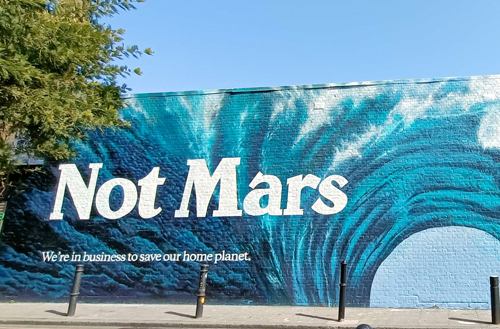
-
-
- 메일 공유
-
https://stories.amorepacific.com/en/amorestories-three-misconceptions-and-truths-about-climate-change
Three Misconceptions and Truths About Climate Change
Engaging and Simplified Tales of ESG #1

Columnist
Son Myung-kwan CSR Team

#INTRO
I’ve frequently heard the term ‘ESG’ (Environment, Social, Governance), yet it remains somewhat unfamiliar. Not being fluent in English adds to the challenge, as each word seems complex. I turn to the internet to search for ‘ESG.’
[ESG is about achieving sustainability in corporate management through three main aspects...]
Hmm... I nod in understanding, only to find myself confused again. ‘Why would companies, whose goal is to generate profits, bother with ESG? Does ESG translate into financial benefits for them?’ This was my initial reaction when I first encountered ESG. Most likely, many of you shared my thoughts. Thus, I aim to unravel ESG in a column format, making it as accessible and engaging as possible by sharing my personal views and experiences. I hope that ESG no longer appears to be a daunting term.
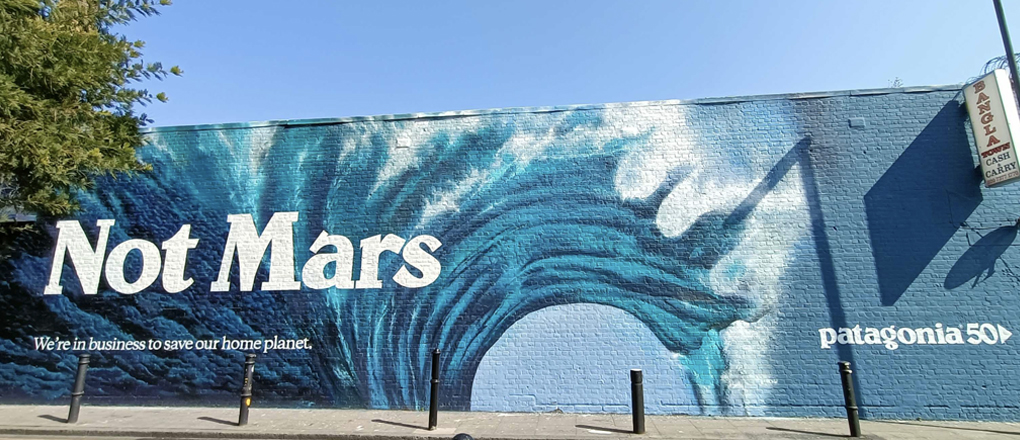
Patagonia Campaign ‘Not Mars’ / Source: www.street-artwork.com
1 The Industrialization-induced Climate Change and the Birth of ESG
Industrial development has been both a blessing and a curse for humanity. Items that took artisans months to produce can now be manufactured in factories within a day. The convenience of producing items quickly and cheaply means there’s little concern over discarding them after a single use. Railroads stretch from one end of the continent to another, and chimneys continuously belch smoke. The 21st century has brought prosperity to human life but at a significant cost to our ecosystems. Especially alarming is the realization that fossil fuels are causing the Earth to warm at an unprecedented rate due to the greenhouse effect. Predictions abound that continuous growth may no longer be sustainable if current trends persist.

However, opinions on climate change remain deeply divided. Comments under articles about unusual winter cold snaps claiming ‘global warming is a hoax,’ scientists asserting that warming is a natural planetary cycle, and even theories suggesting ‘conspiracy fabricated by certain countries or political factions’ are widespread. What, then, is the truth?
2 Misconceptions and Truths About Climate Change
In this article, we’ll explore several misconceptions and truths regarding climate change. Before we delve into the main topic, let’s start with a quick True or False quiz:
Quiz 1. Climate change is a lie.
Quiz 2. There’s no significant problem if the Earth’s temperature rises by 1-2°C.
Quiz 3. Climate change will only affect future generations.
1) The First Misconception – ‘Climate change is a lie’
The answer is False. Climate change is 99% a fact.
This is evident from the IPCC1) climate change reports.
Since its first report in 1990, the IPCC has published reports every 5-10 years. Initially, these reports took a lukewarm stance on the correlation between human activity and climate change. However, as more global climate data have been collected and research has advanced, the conclusions have become increasingly clear: human production activities are driving climate change. The word ‘unequivocal’ frequently appears in the latest 2023 sixth assessment report. Despite the sensitivity of each word in such reports, the use of ‘unequivocal’ suggests that the reality of climate change is beyond doubt.
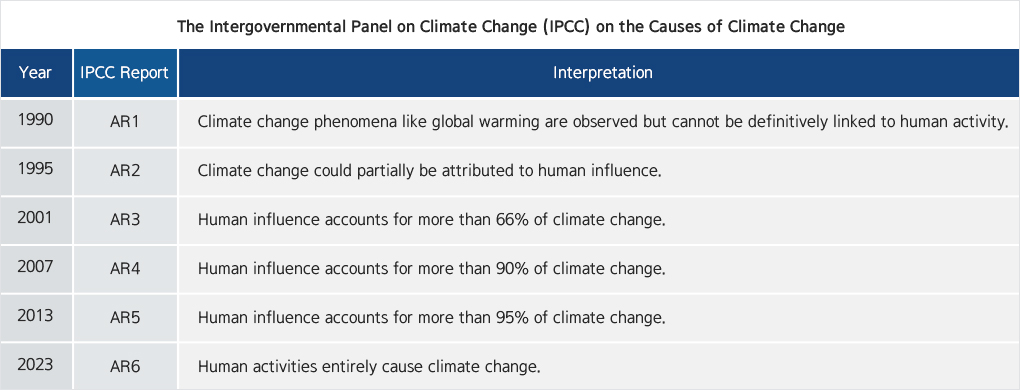
Source: Hankyoreh Article
As an example, upon publishing the 2013 report, an IPCC commissioner remarked,
“It’s no longer a matter of believing in climate change. The question is whether we will follow the science.”
The most apparent evidence lies in the table below, showing the increase in greenhouse gases2) (left) and the rise in Earth’s temperature (right). Starting with the 18th century, the use of coal slightly increased the emission of greenhouse gases, which skyrocketed with the use of oil and the discovery of electricity in the 19th century. As a result of these changes, the Earth’s temperature has risen by about one °C in the last 200 years, a rate 12 times faster than the norm (it typically takes about 2,500 years for the Earth’s temperature to rise by one °C).
1) IPCC (Intergovernmental Panel on Climate Change): Established in 1988 under the United Nations to assess climate change risks and devise international responses. Comprised of representatives from 195 governments and 2,500 scientists, the panel analyzes climate data and regularly publishes comprehensive reports.
2) Greenhouse gases: The six gases that cause the greenhouse effect on Earth (carbon dioxide (CO2), methane (CH4), nitrous oxide (N2O), hydrofluorocarbons (HFCs), perfluorocarbons (PFCs), sulfur hexafluoride (SF6)). Carbon dioxide, which constitutes about 80% of all greenhouse gases, is primarily emitted from burning fossil fuels such as coal and oil and is commonly referred to as ‘greenhouse gas’ or simply ‘carbon.’

Source:
IPCC(Intergovernmental Panel on Climate Change)
2) The Second Misconception – ‘There’s no significant problem if the Earth’s temperature rises by 1-2°C’
The answer is False. A rise above 1.5°C will usher in extreme weather conditions unlike any we have previously experienced.
According to the IPCC report, if the current level of greenhouse gas emissions is maintained, the global average temperature is predicted to increase by 2-4°C within decades. Until a few years ago, I, who enjoy summer, didn’t take this seriously. I thought that whether it was 30°C or 32°C, it was all the same heat level. However, what’s most affected by global warming is ‘water,’ or the oceans. An 1°C increase in the average global temperature results in about a 7% increase in water vapor. The oceans, which cover about 70% of the Earth, generate more water vapor due to warming. This leads to early cloud formation over areas that previously saw no rainfall, causing heavy rains and floods. Conversely, places that used to receive rain now face droughts, killing crops and drying forests, leading to mega wildfires – the strength of typhoons, carrying more water vapor, increases. Trade winds and jet streams weaken, intensifying heatwaves and cold spells. The melting rate of polar ice caps accelerates, raising sea levels (if all of Antarctica were to melt, sea levels could rise by up to 60 m). The oceans become less salty and warmer, reducing fish and coral populations. The list of damages caused by climate change is too extensive to detail comprehensively. In summary, we face unprecedented typhoons, heavy rains, floods, wildfires, droughts, food shortages, and extinctions. For detailed predictions, please refer to the table below.
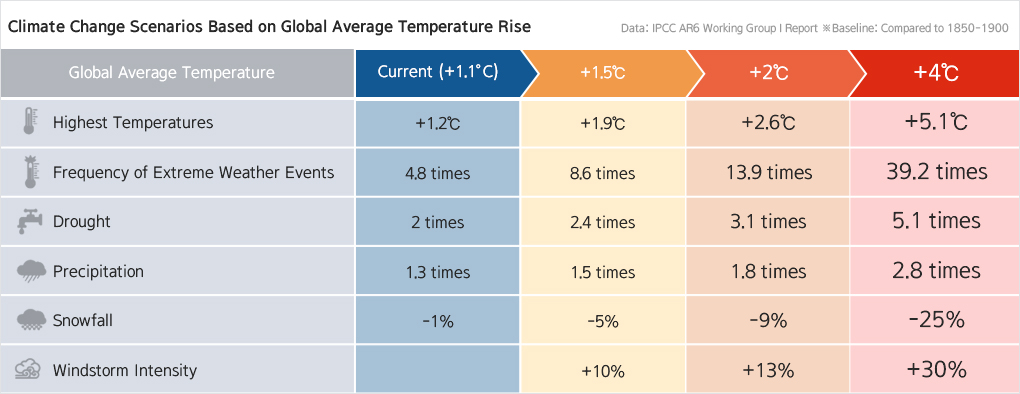
Source: Hankyoreh, August 2021
“The ocean is now absorbing the energy equivalent of exploding four nuclear bombs every second.”
- Nam Seong-hyun, Professor of Earth and Environmental Sciences at Seoul National University (interviewed on KBS 1TV’s “Docu Insight” ‘Boiling Sea’ in 2023)
For this reason, many countries, including ours, are preparing for ‘climate adaptation’ beyond simply responding to climate change. Climate change is an apparent reality, and we are preparing for its weather anomalies. We are now faced with the dual task of reducing carbon emissions and adapting to extreme climates.

Republic of Korea’s Climate Adaptation Communication
Source: Ministry of Environment
3) The Third Misconception – ‘Climate change will only affect future generations’
The answer is False. Extreme weather events have already begun.
“How Dare you”
15-year-old Greta Thunberg said this at the United Nations Climate Change Conference 2018. Her speech, which argued that adults are stealing their children’s future by focusing on economic development, became widely cited. At the time, climate change was considered something that would affect our descendants, not us. However, extreme weather is already upon us. With the advancement in climate measurement, the risks of climate change or “climate catastrophe” are being accelerated. Let’s examine the 2023 IPCC report together.
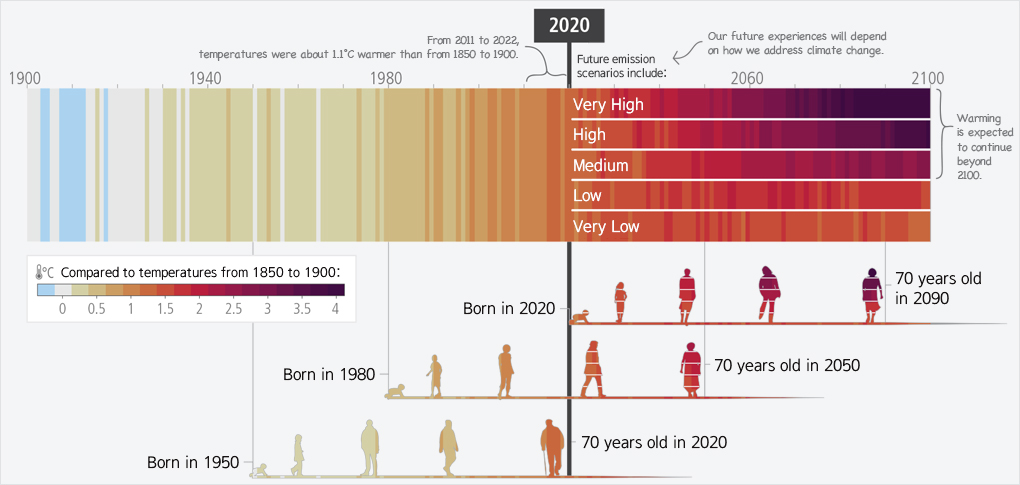
Source: Korea Meteorological Administration
The graph above is based on five carbon emission scenarios (with the current emission level being ‘medium’), depicting the warming trend. Even a 1.5°C increase can trigger various extreme weather events, but the IPCC predicts a 2-3°C rise in 20 years. The high temperatures, cold spells, floods, droughts, and wildfires mentioned earlier are imminent (in fact, it feels like we’re already experiencing them to some extent).
It is a disheartening truth, but even if we were to immediately switch off all power plants and buildings, ceasing to use fossil fuels from now on, the Earth’s temperature is still projected to rise by more than one °C within a few decades. This inevitability stems from the fact that the carbon dioxide already emitted into the atmosphere can remain there for up to 200 years. What changes might my neighborhood undergo? It would be beneficial to consult the regional climate change scenarios provided by the meteorological service. These offer forecasts for each area based on various carbon emission scenarios, predicting the likelihood of heatwaves, tropical nights, cold waves, and precipitation.
3 After Dispelling Three Misconceptions
Initially, I promised an engaging and simplified take on ESG, but it has felt somewhat heavy. It almost feels like the approach of an apocalyptic scenario from a movie (lately referred to as “climate depression”). However, there’s no need for excessive despair. There’s still a chance. The Earth has a homeostatic mechanism aimed at maintaining its temperature. The IPCC suggests that if the temperature rise can be kept to no more than 1.5°C above current levels, there’s a possibility of returning to our previous climate. There’s still an opportunity.
“The climate action we take in the next ten years will determine the next thousand years.”
- From the 2023 IPCC Report
#Thus Began the Group Assignment for 8 Billion Earthlings
Numerous countries and companies strive to reduce carbon emissions to combat climate change. Amorepacific also participates in this “group assignment for 8 billion earthlings.” Amorepacific plans to achieve carbon neutrality at its global production sites by 2030 and to accomplish zero waste to landfill. Through technological and process innovations, the company is working to reduce the environmental footprint throughout the entire lifecycle of its products, from raw materials to disposal, and is transitioning to renewable energy for its operations. Notably, in 2023, these efforts were recognized when Amorepacific, along with Google and Givaudan, received the ‘RE100 Leadership Award’ during New York Climate Week and, for two consecutive years, achieved the highest rating of A from the Carbon Disclosure Project (CDP), where 23,000 companies worldwide responded, and only ten companies in Korea earned an A rating.

Yet, looking at global trends, the journey ahead appears lengthy. Recent wars and inflation have prioritized short-term perspectives (energy supply stabilization, economic stimulation) over a long-term ESG outlook. While industrialized countries like Europe and the United States find it easier to reduce carbon emissions (in fact, Europe has seen a reduction in greenhouse gas emissions since the turn of the 21st century), primary manufacturing nations and high-growth countries like India and China face challenges. Economic growth through industrial activity is essential for them, but carbon barriers are catching up with them. Oil-producing countries in the Middle East, too, are hesitant to take steps forward, as their growth is tied to selling oil. This is why significant agendas often remain unresolved at annual climate forums. Moreover, during election seasons, environmental issues are politicized, causing nations to lose sight of long-term goals and flounder.
However, we cannot afford to stand by. No one desires to be remembered by future generations as the era focused solely on economic growth to its demise. In our collective assignment for 8 billion, we must all strive for an A+ grade. In the next column, I’ll discuss the efforts we can make towards carbon reduction and the direction companies need to take for sustainable growth.
-
Like
0 -
Recommend
1 -
Thumbs up
1 -
Supporting
0 -
Want follow-up article
0





